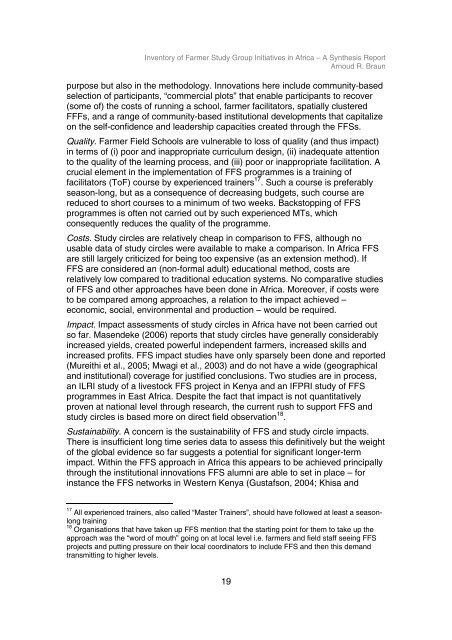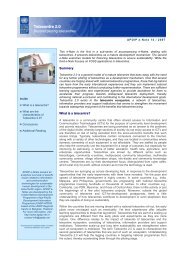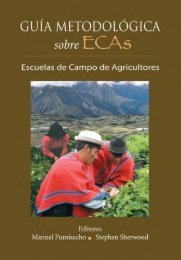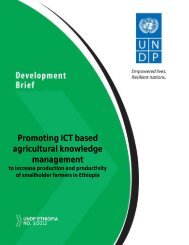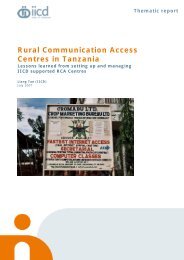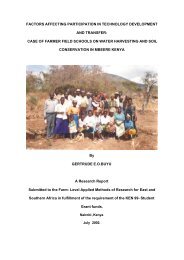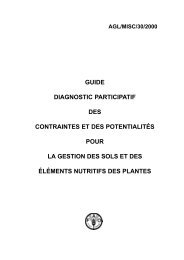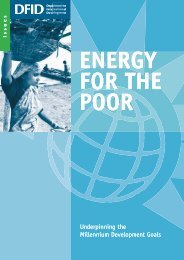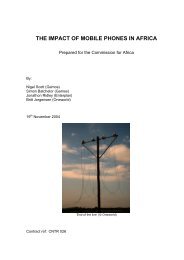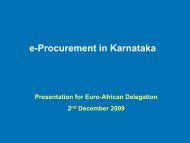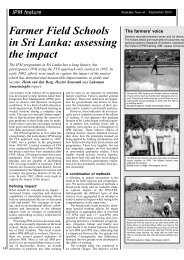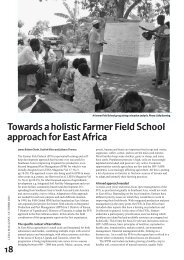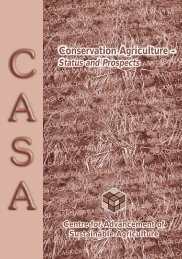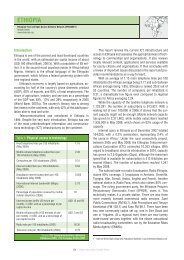inventory of farmer study group initiatives in africa - Share4Dev.info
inventory of farmer study group initiatives in africa - Share4Dev.info
inventory of farmer study group initiatives in africa - Share4Dev.info
You also want an ePaper? Increase the reach of your titles
YUMPU automatically turns print PDFs into web optimized ePapers that Google loves.
Inventory <strong>of</strong> Farmer Study Group Initiatives <strong>in</strong> Africa – A Synthesis Report<br />
Arnoud R. Braun<br />
purpose but also <strong>in</strong> the methodology. Innovations here <strong>in</strong>clude community-based<br />
selection <strong>of</strong> participants, “commercial plots” that enable participants to recover<br />
(some <strong>of</strong>) the costs <strong>of</strong> runn<strong>in</strong>g a school, <strong>farmer</strong> facilitators, spatially clustered<br />
FFFs, and a range <strong>of</strong> community-based <strong>in</strong>stitutional developments that capitalize<br />
on the self-confidence and leadership capacities created through the FFSs.<br />
Quality. Farmer Field Schools are vulnerable to loss <strong>of</strong> quality (and thus impact)<br />
<strong>in</strong> terms <strong>of</strong> (i) poor and <strong>in</strong>appropriate curriculum design, (ii) <strong>in</strong>adequate attention<br />
to the quality <strong>of</strong> the learn<strong>in</strong>g process, and (iii) poor or <strong>in</strong>appropriate facilitation. A<br />
crucial element <strong>in</strong> the implementation <strong>of</strong> FFS programmes is a tra<strong>in</strong><strong>in</strong>g <strong>of</strong><br />
facilitators (ToF) course by experienced tra<strong>in</strong>ers 17 . Such a course is preferably<br />
season-long, but as a consequence <strong>of</strong> decreas<strong>in</strong>g budgets, such course are<br />
reduced to short courses to a m<strong>in</strong>imum <strong>of</strong> two weeks. Backstopp<strong>in</strong>g <strong>of</strong> FFS<br />
programmes is <strong>of</strong>ten not carried out by such experienced MTs, which<br />
consequently reduces the quality <strong>of</strong> the programme.<br />
Costs. Study circles are relatively cheap <strong>in</strong> comparison to FFS, although no<br />
usable data <strong>of</strong> <strong>study</strong> circles were available to make a comparison. In Africa FFS<br />
are still largely criticized for be<strong>in</strong>g too expensive (as an extension method). If<br />
FFS are considered an (non-formal adult) educational method, costs are<br />
relatively low compared to traditional education systems. No comparative studies<br />
<strong>of</strong> FFS and other approaches have been done <strong>in</strong> Africa. Moreover, if costs were<br />
to be compared among approaches, a relation to the impact achieved –<br />
economic, social, environmental and production – would be required.<br />
Impact. Impact assessments <strong>of</strong> <strong>study</strong> circles <strong>in</strong> Africa have not been carried out<br />
so far. Masendeke (2006) reports that <strong>study</strong> circles have generally considerably<br />
<strong>in</strong>creased yields, created powerful <strong>in</strong>dependent <strong>farmer</strong>s, <strong>in</strong>creased skills and<br />
<strong>in</strong>creased pr<strong>of</strong>its. FFS impact studies have only sparsely been done and reported<br />
(Mureithi et al., 2005; Mwagi et al., 2003) and do not have a wide (geographical<br />
and <strong>in</strong>stitutional) coverage for justified conclusions. Two studies are <strong>in</strong> process,<br />
an ILRI <strong>study</strong> <strong>of</strong> a livestock FFS project <strong>in</strong> Kenya and an IFPRI <strong>study</strong> <strong>of</strong> FFS<br />
programmes <strong>in</strong> East Africa. Despite the fact that impact is not quantitatively<br />
proven at national level through research, the current rush to support FFS and<br />
<strong>study</strong> circles is based more on direct field observation 18 .<br />
Susta<strong>in</strong>ability. A concern is the susta<strong>in</strong>ability <strong>of</strong> FFS and <strong>study</strong> circle impacts.<br />
There is <strong>in</strong>sufficient long time series data to assess this def<strong>in</strong>itively but the weight<br />
<strong>of</strong> the global evidence so far suggests a potential for significant longer-term<br />
impact. With<strong>in</strong> the FFS approach <strong>in</strong> Africa this appears to be achieved pr<strong>in</strong>cipally<br />
through the <strong>in</strong>stitutional <strong>in</strong>novations FFS alumni are able to set <strong>in</strong> place – for<br />
<strong>in</strong>stance the FFS networks <strong>in</strong> Western Kenya (Gustafson, 2004; Khisa and<br />
17 All experienced tra<strong>in</strong>ers, also called “Master Tra<strong>in</strong>ers”, should have followed at least a seasonlong<br />
tra<strong>in</strong><strong>in</strong>g<br />
18 Organisations that have taken up FFS mention that the start<strong>in</strong>g po<strong>in</strong>t for them to take up the<br />
approach was the “word <strong>of</strong> mouth” go<strong>in</strong>g on at local level i.e. <strong>farmer</strong>s and field staff see<strong>in</strong>g FFS<br />
projects and putt<strong>in</strong>g pressure on their local coord<strong>in</strong>ators to <strong>in</strong>clude FFS and then this demand<br />
transmitt<strong>in</strong>g to higher levels.<br />
19


